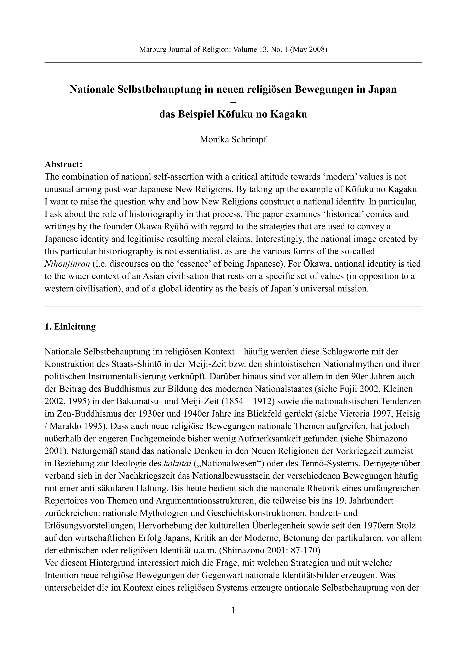Nationale Selbstbehauptung in neuen religiösen Bewegungen in Japan - das Beispiel Kōfuku no Kagaku
The combination of national self-assertion with a critical attitude towards ‘modern’ values is not unusual among post-war Japanese New Religions. By taking up the example of Kōfuku no Kagaku I want to raise the question why and how New Religions construct a national identity. In particular, I ask ab...
Gespeichert in:
| Veröffentlicht in: | Marburg Journal of Religion |
|---|---|
| 1. Verfasser: | |
| Format: | Artikel (Zeitschrift) |
| Sprache: | Deutsch |
| Veröffentlicht: |
Philipps-Universität Marburg
2008
|
| Online Zugang: | Online Zugang |
| Tags: |
Tag hinzufügen
Keine Tags, Fügen Sie den ersten Tag hinzu!
|
| Zusammenfassung: | The combination of national self-assertion with a critical attitude towards ‘modern’ values is not unusual among post-war Japanese New Religions. By taking up the example of Kōfuku no Kagaku I want to raise the question why and how New Religions construct a national identity. In particular, I ask about the role of historiography in that process. The paper examines ‘historical’ comics and writings by the founder Ōkawa Ryūhō with regard to the strategies that are used to convey a Japanese identity and legitimise resulting moral claims. Interestingly, the national image created by this particular historiography is not essentialist, as are the various forms of the so-called Nihonjinron (i.e. discourses on the ‘essence’ of being Japanese). For Ōkawa, national identity is tied to the wider context of an Asian civilisation that rests on a specific set of values (in opposition to a western civilisation), and of a global identity as the basis of Japan’s universal mission. |
|---|---|
| DOI: | 10.17192/mjr.2008.13.3599 |
 Publikationsserver
Publikationsserver